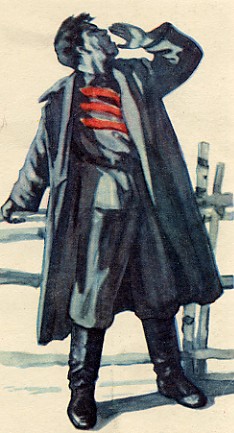| "Tale of the Military Secret" |
|
Page 5 |
| "Tale of the Military Secret" |
|
Page 5 |
 The boy climbed down off the porch and brought some water. The messenger drank his fill and galloped off.
The boy climbed down off the porch and brought some water. The messenger drank his fill and galloped off.
 "Am I telling it right, Alka?" Natka asked as she took a breath and looked around.
"Am I telling it right, Alka?" Natka asked as she took a breath and looked around.

|
Russian Version |

|
| © 2012 SovLit.net |